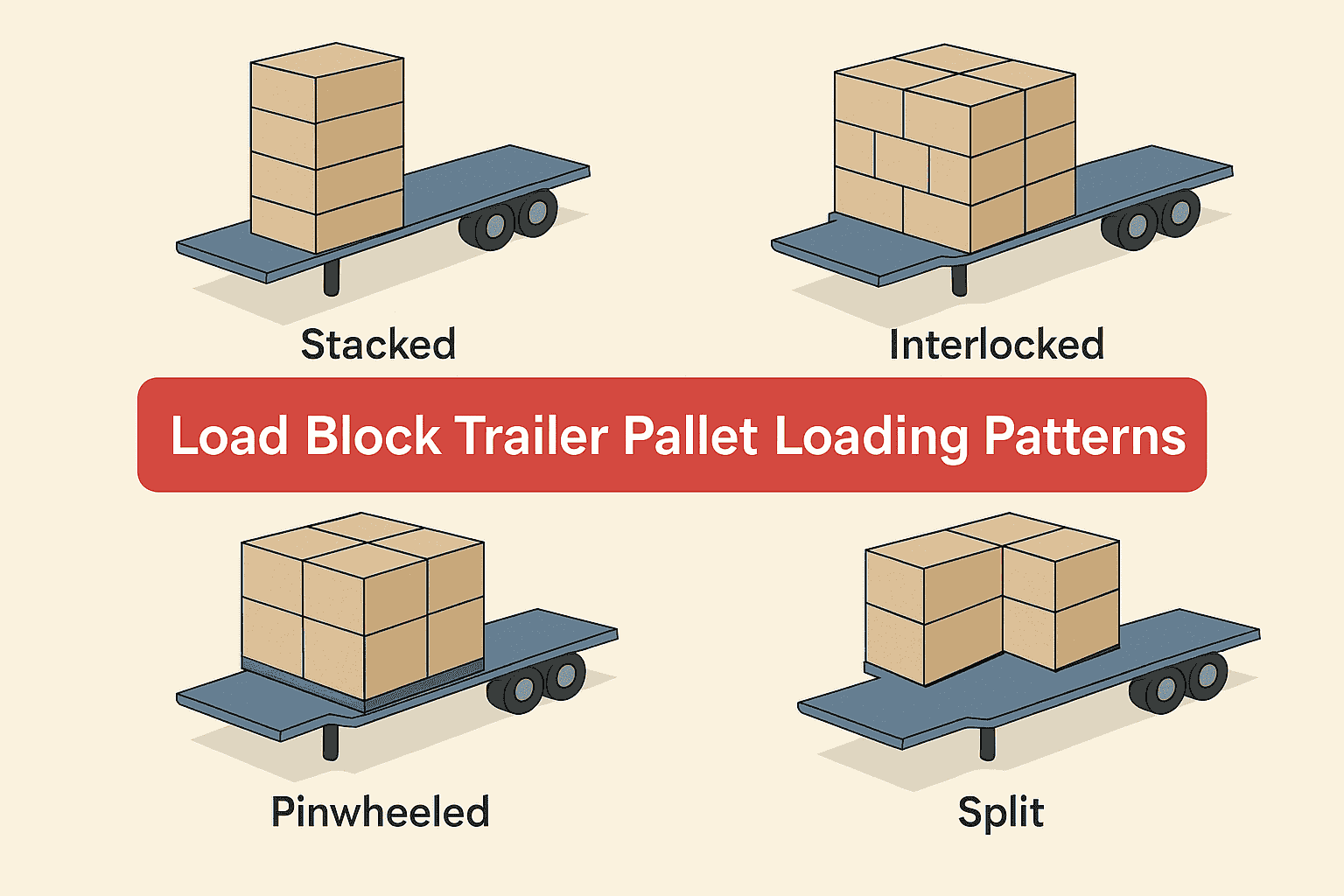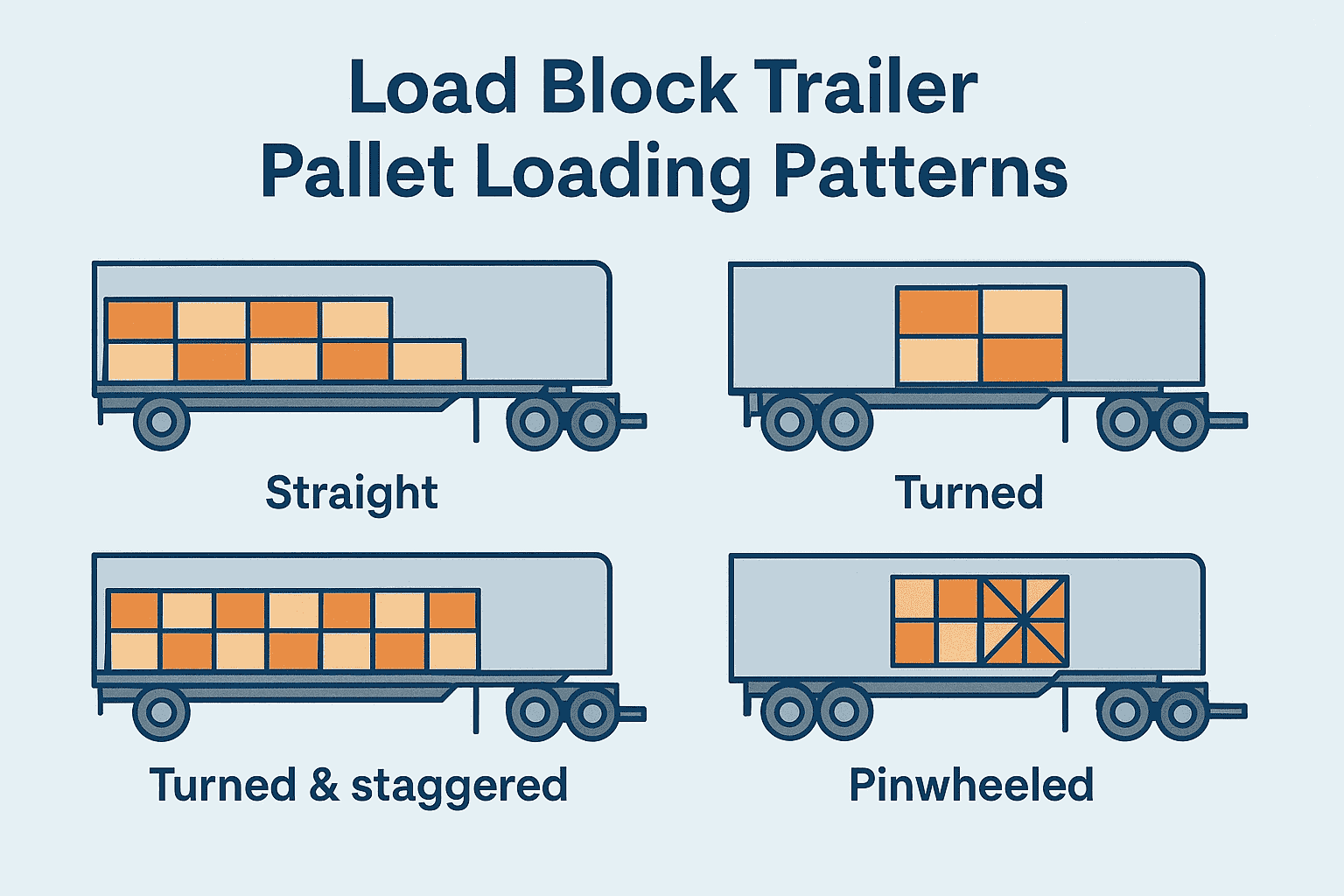Load Block Trailer Pallet Loading Patterns
Efficient loading patterns for trailer pallets are important. They help with supply chain management, warehouse efficiency, and safe transportation. Businesses that transport goods between cities or countries need to load pallets correctly. They must stack items well and use diagram templates. This helps them make the most of trailer space and keep products safe.
In this guide, we at TecnoTales explain everything you need to know about pallet loading. We cover 53-foot trailer pallet loading diagrams, pinwheel pallet loading, and smart stacking techniques.
Why Pallet Loading Patterns Matter
The way products are stacked on pallets and loaded into trailers can make or break the shipping process. Poor pallet loading not only wastes valuable trailer space but also increases the risk of product damage. With the right pallet stacking patterns and trailer loading diagram, businesses can:
Maximize trailer capacity
Protect cartons and goods during transit
Save costs on additional shipments
Improve warehouse productivity
Standardize operations with a pallet loading template
Understanding Pallet Loading Basics
Before examining 53-foot trailer pallet loading patterns, it’s important to understand the basics of pallet stacking. You should also know about different setups.
What is a Pallet?
A pallet is a flat structure, often made of wood pallets, used as a base for transporting cartons and goods. Pallets come in standard sizes like 40×48 inches, which affect how they fit inside trailers.
Pallet Stacking and Packing
Pallet stacking is the process of placing cartons on a pallet in specific stacking patterns. This can be done in:
Column stacking: Boxes are stacked directly on top of each other in vertical columns.
Interlocking pallets (pinwheel loading): Boxes are alternated in a crisscross pattern to improve stability.
T stacking boxes: Placing boxes in a “T” formation for stronger load support.
A pallet stacking guide helps employees follow proper packing and stacking rules to prevent accidents and maximize trailer use.

53 Foot Trailer Pallet Loading Patterns
A 53 foot trailer is the most common trailer size used in logistics. Businesses often ask: “How many diagram 53 foot trailer pallet loading patterns are available?”
Standard 53 Foot Trailer Pallet Loading Diagram
A 53 ft trailer can hold 26 to 30 pallets. This depends on how the pallets are stacked and their size.
Single-stacked pallets: Around 26 pallets fit on the floor.
Double stacking pallets: Up to 52 pallets can be accommodated if the products are safe for stacking.
Pinwheel Loading in 53 Foot Trailer
Pinwheel pallet loading (also called pinwheeled loading) involves alternating pallet directions. This helps maximize space and stabilize stacks of pallets. In some cases, pinwheel pallets allow trailers to fit an extra row compared to column loading.
Chimney Blocked Pallet Loading Map
In certain configurations, a chimney blocked pallet loading map is used. This pattern allows airflow and stability when transporting perishable goods.
Pinwheel Pallet Loading Explained
What is Pinwheel Loading?
Pinwheel loading pallets or pinwheel pallet loading is a method. In this method, pallets are turned 90 degrees. They are then placed in an alternating pattern to create a crisscross structure.
This pattern is beneficial when:
Maximizing trailer space
Preventing pallet shift during transport
Creating stronger pallet stack patterns
Benefits of Pinwheeled Loading
Reduces wasted trailer space
Provides more stability for stacked goods
Improves handling efficiency
Works with pallet stacking frames for added safety
Pallet Stack and Stacking Patterns
Common Pallet Stack Patterns
There are multiple pallet patterns depending on cargo type:
Column stacking: Best for lightweight goods.
Interlocking pallets: Good for mixed cargo.
Pinwheel pallet: Ideal for maximizing space.
Chimney block loading: For perishable goods.
Double stacked pallets – For durable cartons.
How to Stack a Pallet
When learning how to stack a pallet, follow these tips:
Use a pallet configuration diagram.
Place heavier cartons at the bottom.
Avoid overhanging boxes.
Follow the pallet ti hi system.
Pallet TI HI Calculation
The pallet ti hi (pronounced “tie high”) measures how many cases fit in one layer (TI) and how many layers are stacked (HI).
For example:
TI = 10 cases per layer
HI = 5 layers
Total = 50 cases per pallet
Using a pallet configuration helps figure out how many boxes are on a pallet. It also shows how many cases are on the pallet.

Stacking and Safety in Pallet Loading
Stacking Diagram and Guidelines
A stacking diagram or trailer loading diagram ensures that cartons are placed correctly. This reduces risks of collapse.
Double Stacking Pallets
Double stacked pallets can increase trailer capacity but must be done carefully to avoid crushing goods. Always check how high can you stack a pallet safely.
Stacking Boxes and Cartons on Pallets
Always align boxes on pallets properly.
Use shrink wrap to secure stacked pallets.
Avoid unstable box stacking.
Remember, stacking and piling is another term for what structural system? – It is considered a load-bearing system in logistics.
Pallet Loading in Warehouses
Pallets in a Warehouse
Pallets in a warehouse are organized in rows and columns, often using pallet stacking frames for vertical storage.
Pallet on Pallet Method
Some warehouses use a pallet on pallet technique to maximize vertical space. However, this is only safe with strong cartons and proper pallet stacking patterns.
Stacking and Piling for Inventory
Efficient cargo stacking allows warehouses to store more goods while minimizing damage. Packing and stacking techniques ensure easy access for forklifts.
Best Practices for Pallet Loading
Optimize with a Pallet Loading Template
A pallet loading template helps standardize loading, ensuring every worker follows the same method.
Use Proper Equipment
Forklifts, pallet stacking frames, and safety straps ensure stable pallet stacked formations.
Train Workers
Employees should be trained on how to stack boxes on a pallet, pallet stack patterns, and calculate ti hi correctly.
Inspect Pallets
Always check wood pallets for damage before stacking. Broken pallets can collapse under weight.
Follow Safety Standards
Government and industry rules often say how many cases go on a pallet. They also set limits on how high you can stack a pallet. Following these standards reduces workplace accidents.
Conclusion
Proper load block trailer pallet loading patterns are the backbone of efficient logistics. From 53-foot trailer pallet loading diagrams to pinwheel pallet loading, every detail matters. These details help with safety, saving money, and using space well.
At TecnoTales, we believe businesses should use pallet loading templates. They should also train staff on pallet stack patterns. Using pallet stacking guides can help improve operations. Learning these methods will help you do better in your supply chain. You can use them to count boxes on a pallet. You can also use them to create a stacking diagram.
By implementing the right pallet configuration and stacking techniques, companies can reduce waste, improve safety, and achieve higher profitability in their logistics operations.
FAQs
1. How many pallets fit in a 53 foot trailer?
A standard 53 foot trailer pallet loading diagram shows that about 26 pallets fit when single stacked on the floor. With double stacking pallets, you can fit up to 52 pallets depending on the product type and packaging strength.
2. What is pinwheel pallet loading?
Pinwheel pallet loading, or pinwheeled loading, is a method. In this method, pallets are alternated and rotated. This helps to maximize trailer space and increase stability. This technique prevents load shifting and is widely used in 53 foot trailer pallet loading patterns.
3. What is pallet TI HI?
Pallet TI HI refers to how products are stacked on a pallet. TI is the number of cartons per layer, while HI is the number of layers. For example, if a pallet holds 10 cartons per layer and is stacked 5 layers high, the TI HI is 10×5 = 50 cartons per pallet.
4. What is the safest way to stack boxes on a pallet?
To safely stack boxes on a pallet, place heavier cartons at the bottom, avoid overhanging, use stretch wrap, and follow a pallet stacking guide. Methods like column stacking or interlocking pallets improve stability during transit.
5. How high can you stack a pallet?
The safe height depends on product weight and packaging. Generally, pallets should not exceed 60 to 72 inches high to maintain balance and safety. Always follow warehouse safety guidelines and use a stacking diagram to avoid tipping.